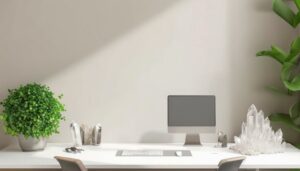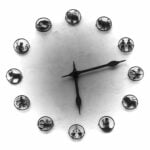By positioning your desk with your back against a solid wall, you harness supportive energy, boosting productivity and focus. This setup minimizes distractions, reducing anxiety and preserving mental energy. With a wall-facing desk, you'll stay focused, motivated, and in control, making it ideal for individuals requiring extra support and comfort. As you create a calm work environment, you'll tap into increased efficiency, better time management, and a sense of stability. Now, discover the additional benefits of applying Feng Shui principles to maximize your energy and success.
Key Takeaways
- A wall-facing desk harnesses supportive energy, boosting productivity and focus, making it ideal for creative and intellectual professionals.
- This setup minimizes distractions, reducing anxiety and improving focus, and is particularly beneficial for individuals with ADHD.
- A solid wall behind the desk is essential to reap the benefits of this placement, providing a sense of stability and security.
- By reducing visual stimuli, a wall-facing desk promotes mental clarity, increases efficiency, and enhances creativity and problem-solving skills.
- Applying Feng Shui principles, such as balancing the space with the Five Elements, can further create a harmonious and productive work environment.
Understanding Wall-Facing Desks
When you position your desk with your back against a solid wall, you're harnessing the supportive energy of the wall, a fundamental principle of Feng Shui that can boost your productivity and focus.
This wall-facing desk placement is particularly beneficial for individuals who require extra support and comfort, such as those in creative or intellectual professions.
By placing your desk in this way, you're creating a sense of stability and security, which can help you stay focused and motivated.
It's vital to verify that the wall behind your desk is solid and sturdy, as a fragile or unstable wall can negate the benefits of this placement.
A wall-facing desk is all about harnessing the supportive energy of the wall, so it's essential to get it right.
Benefits of Reduced Distractions
By positioning your desk facing a solid wall, you're not only harnessing supportive energy, but also minimizing distractions that can derail your focus and productivity. With a wall-facing desk, you'll experience reduced distractions, allowing you to stay focused on your tasks.
Here's a breakdown of the benefits:
| Distractions | Wall-Facing Desk Benefits |
|---|
| Colleagues, meetings, and office activities | Reduced interruptions, increased focus |
| Sudden interruptions | Sense of control, reduced anxiety |
| Digital notifications | Minimized distractions, improved focus |
| Non-essential conversations | Preserved mental energy, reduced fatigue |
Boosting Productivity and Focus
As you position your desk facing a wall, you'll find that you're better equipped to tackle tasks with sustained focus and energy. This setup helps you avoid distractions, allowing you to concentrate on the task at hand.
In fact, individuals with ADHD often benefit from a wall-facing desk, as it limits visual stimuli and promotes concentration. By reducing the likelihood of procrastination, you'll feel more in control and motivated to tackle your tasks.
Research published in the Journal of Environmental Psychology confirms that employees who face a wall while working report higher levels of satisfaction and engagement.
In Feng Shui, a wall-facing desk is considered a 'protected' position, which can enhance your creativity and problem-solving skills.
By minimizing visual distractions, you'll stay on task for longer periods, leading to increased efficiency and better time management.
With a wall-facing desk, you'll be more productive, focused, and efficient, making it an ideal setup for achieving your goals.
Reducing Stress and Anxiety
You'll find that the wall-facing desk's ability to minimize visual stimuli also helps to calm your mind, reducing feelings of stress and anxiety. By facing a wall, you're not constantly distracted by coworkers, meetings, or other office commotion. This reduction in visual noise allows your brain to focus on the task at hand, rather than being overwhelmed by stimuli.
| Benefits | Effects on Stress and Anxiety | Results |
|---|
| Reduced visual stimuli | Decreased feelings of overwhelm | Improved mental clarity |
| Minimized distractions | Lower blood pressure and heart rate | Enhanced focus |
| Increased sense of control | Reduced anxiety and stress hormones | Boosted mood |
Creating a Calm Work Environment
To create a calm work environment, position your desk in a commanding position, sitting with your back to a solid wall and facing the door, but not directly in line with it. This setup provides a sense of stability and support, helping to reduce stress and anxiety. When you sit with your back to a wall, you'll feel more secure and protected, allowing you to focus on your work without distractions.
Avoid placements under beams or sloping ceilings, which can create a feeling of pressure and discomfort.
Add plants or calming artwork to your workspace to further promote a calming atmosphere and boost productivity.
Minimize distractions by positioning your desk away from high-traffic areas or noisy spaces.
Keep your workspace organized, as clutter can contribute to feelings of anxiety and overwhelm.
Applying Feng Shui Principles
By incorporating Feng Shui principles into your workspace design, you can harness the benefits of a wall-facing desk to boost productivity and overall well-being. A wall-facing desk can provide a sense of stability and support, promoting feelings of calmness and reducing anxiety. It can also help minimize distractions, allowing you to focus on your work and increase productivity.
To enhance the benefits of a wall-facing desk, consider the Five Elements of Feng Shui and balance the space with elements such as wood, fire, earth, metal, and water. This will create a harmonious and productive work environment. Here's a breakdown of the Five Elements and how to incorporate them into your workspace:
| Element | Description | Incorporation Ideas |
|---|
| Wood | Represents growth and creativity | Add a plant or wooden decorative item |
| Fire | Represents energy and passion | Use a desk lamp or add a fiery-colored decor |
| Earth | Represents stability and grounding | Add a stone or ceramic decorative item |
| Metal | Represents clarity and precision | Use a metal pen holder or add a metallic decor |
| Water | Represents calmness and relaxation | Add a water-inspired decorative item or a small fountain |
Maximizing Energy and Success
As you incorporate Feng Shui principles into your workspace, you can maximize energy and success by strategically placing your desk in a commanding position, like against a wall, to boost your confidence and productivity.
This powerful position can bring a sense of calmness, control, and stability, leading to increased productivity and success.
By placing your desk against a wall, you can reduce distractions and minimize interruptions, allowing you to focus on your work and achieve your goals more efficiently.
You can also create a sense of security and protection, which can be particularly beneficial for individuals who feel anxious or uncertain in their work environment.
Additionally, this positioning can boost your confidence and productivity, leading to increased success and achievement.
Effective Work Desk Placement
By sitting with a solid wall behind you, you'll feel a sense of support and stability, which can lead to increased productivity and confidence. This setup also helps reduce distractions and interruptions, as coworkers or visitors are less likely to approach from behind. As an introvert, you'll appreciate the ability to focus on your work without feeling anxious or overwhelmed by your surroundings.
To guarantee a comfortable and effective workspace, make sure the area is well-lit and comfortable. Avoid feelings of claustrophobia or isolation by adding some greenery or decorative elements to the space.
With a wall-facing desk placement, you'll be able to focus on your tasks without distractions, allowing you to stay motivated and productive throughout the day. By incorporating this simple yet effective layout into your workspace, you'll be amazed at how it can boost your energy and overall well-being.
Frequently Asked Questions
Should My Desk Face the Wall in Feng Shui?
Considering your workspace, you're wondering if your desk should face the wall, right? In Feng Shui, a wall-facing desk boosts energy and productivity, providing stability and reducing distractions, but make certain the wall's not too close and clutter-free.
Should Your Desk Be Against the Wall?
You're wondering if your desk should be against the wall. Generally, it's a good idea, as it provides support and stability, reduces distractions, and gives you a sense of control and empowerment.
How Do I Feng Shui My Desk for Wealth?
You boost wealth by placing your desk diagonally from the door, in the southeast corner, and keeping it organized with only essential items, incorporating wealth-attracting elements and balancing elements like metal or earth accents.
What Direction Should I Face My Desk?
As you ponder the ideal direction for your desk, consider your personal energy, or 'gua', calculated from your birthdate, and experiment with different directions to find what boosts your energy and productivity, feeling most aligned and focused.













